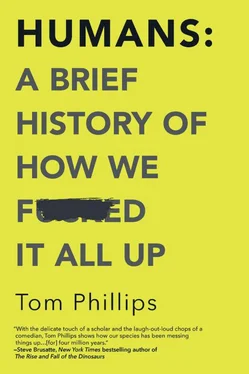Tom Phillips - Humans - A Brief History of How We F*cked It All Up
Здесь есть возможность читать онлайн «Tom Phillips - Humans - A Brief History of How We F*cked It All Up» весь текст электронной книги совершенно бесплатно (целиком полную версию без сокращений). В некоторых случаях можно слушать аудио, скачать через торрент в формате fb2 и присутствует краткое содержание. Город: Toronto, Год выпуска: 2019, ISBN: 2019, Издательство: Hanover Square Press, Жанр: История, Юмористические книги, на английском языке. Описание произведения, (предисловие) а так же отзывы посетителей доступны на портале библиотеки ЛибКат.
- Название:Humans: A Brief History of How We F*cked It All Up
- Автор:
- Издательство:Hanover Square Press
- Жанр:
- Год:2019
- Город:Toronto
- ISBN:978-1-48805-113-5
- Рейтинг книги:4 / 5. Голосов: 1
-
Избранное:Добавить в избранное
- Отзывы:
-
Ваша оценка:
- 80
- 1
- 2
- 3
- 4
- 5
Humans: A Brief History of How We F*cked It All Up: краткое содержание, описание и аннотация
Предлагаем к чтению аннотацию, описание, краткое содержание или предисловие (зависит от того, что написал сам автор книги «Humans: A Brief History of How We F*cked It All Up»). Если вы не нашли необходимую информацию о книге — напишите в комментариях, мы постараемся отыскать её.
Humans: A Brief History of How We F*cked It All Up — читать онлайн бесплатно полную книгу (весь текст) целиком
Ниже представлен текст книги, разбитый по страницам. Система сохранения места последней прочитанной страницы, позволяет с удобством читать онлайн бесплатно книгу «Humans: A Brief History of How We F*cked It All Up», без необходимости каждый раз заново искать на чём Вы остановились. Поставьте закладку, и сможете в любой момент перейти на страницу, на которой закончили чтение.
Интервал:
Закладка:
Of the two leaders, Napoleon’s rationale for going ahead with the plan was marginally better than Hitler’s. For starters, he didn’t have the example of Napoleon’s previous failure as a useful guide. He also had every reason to be confident of victory, given the Harlem Globetrotters–level winning streak his Grande Armée were on up to that point. Additionally, he had some legitimate mild beef with Tsar Alexander, who he thought was undermining his economic blockade of the British, the only other major holdout to his total European conquest. Granted, quibbling over a trade embargo isn’t really a great reason to begin hostilities with a massive country. If Napoleon made one key mistake, it’s that his methods of getting his way pretty much started and ended with “have a war.” Diplomacy and negotiation were not really his strong suit.
With his decision that he was going to invade somebody effectively premade, Napoleon must have thought Russia seemed like a safer bet than Britain, because at least it was overland. And knowing that the Russian climate effectively only gave him three months of invading time, he came up with a strategy: head straight for Moscow and force the Russians into a pitched battle, which he would win thanks to having an army who were actually motivated and good at their jobs rather than a load of mercenaries being ordered around by aristocrats.
Unfortunately, this was one of those plans that sounds great when you say it, but entirely relies on your opponents doing exactly what you want them to do. Instead, the Russians pretty much allowed them to march in. They retreated and retreated, avoiding major battles wherever possible, all the while scorching the earth to deny the French supplies, and simply waited for the winter to arrive and do the job for them. By the time Napoleon realized what the game was, it was too late to get out before the cold bit, and the French were forced into the long, grim death march home with a shattered army. The rest of Europe suddenly saw weakness where previously there had only been strength, and that was the beginning of the end for Napoleon.
In 1941, Hitler was in a similar position: having also discovered the difficulties of invading Britain, due to the whole island business, he, too, decided he had a narrow summer window in which to invade the Soviet Union as an alternative. Granted, he actually had a nonaggression pact with the Soviets at the time, but on the other hand he was a Nazi and they were communists and so he hated them.
Hitler actually studied Napoleon’s strategy and thought he’d come up with a clever plan to avoid the same mistakes. Rather than sending all his forces directly at Moscow, he’d divide them into three, attacking Leningrad and Kiev as well as the Soviet capital. And unlike Napoleon, he wouldn’t retreat at the first sign of winter, but stand and fight. These were both disastrous choices. What he didn’t spot was that although the tactics might be different, the basic plan (strike quickly and decisively, win big battles easily, assume this all leads to the swift collapse of your opponents) remained the same. As did its flaws (relies on opponents to follow your script, no plan B when they mysteriously don’t, still completely ignoring the thing about the Russian winter).
There were plenty of people in the German High Command who could have pointed these flaws out to Hitler, but as soon as he caught a whiff of dissent or skepticism, he would keep them in the dark about his plans, or flat-out lie to them. It was a decision-making process based in equal parts on hubris, wishful thinking and sticking his head in the sand.
The strategy’s flaws were the same as Napoleon’s, and the outcome was roughly the same, too, albeit even more deadly this time around. The Germans made major territorial gains and won some battles, but the Soviets didn’t collapse like the script demanded. They used scorched-earth tactics and kept the Germans bogged down until winter, at which point it turned out that they didn’t have the right clothes, enough supplies or indeed antifreeze for their tanks. Hitler’s orders to stay and fight in the bitter cold rather than retreating didn’t bring him any greater success; it just killed more of his soldiers. For the second time, an army that had conquered much of continental Europe was catastrophically weakened by a needless invasion of Russia, and the tide of the war was turned.

As a bonus, at about the same time, Germany’s allies in Japan were busy launching their own badly thought-through attack on Pearl Harbor that needlessly dragged a superpower into a war they’d been trying to stay out of. Without those two woefully poor choices, the Axis powers might have won. Proving that just sometimes, humans’ extremely poor decision-making skills can work out for the best in the long run (at least assuming you’re not a fan of Hitler).
With the Americans and the Japanese now engaged in battle on the Pacific, there was a chance to prove that the fog of war can involve very literal fog as well as the metaphorical kind. That was the case on Kiska, a barren but strategically important island in the North Pacific that lies about halfway between Japan and Alaska (of which it is a very remote part). It was one of two islands captured by the Japanese in 1942 at the height of World War II, which freaked the Americans out because it was the first time since they fought the British in 1812 that their territory had been occupied. Even if the territory was extremely small and far away.
In the summer of 1943, 34,000 US and Canadian troops prepared to try and recapture Kiska. They were still bruised and wary from the experience of retaking nearby Attu Island, a brutal and bloody affair in which the Japanese forces had fought to the death. The operation’s commanders were certain that the battle for Kiska would be every bit as ferocious. When they landed on August 15, the Allied forces found Kiska shrouded in thick, freezing fog. In hellish conditions of bitter cold, wind and rain with zero visibility, they blindly picked their way step by step across the rocky terrain, trying to avoid mines and booby traps, while all the time bursts of gunfire from unseen enemies lit up the fog around them. For 24 hours they dodged sniper fire and painfully inched their way up the slope toward the center of the island, accompanied by muffled explosions from artillery shells, the staccato sound of nearby firefights and indistinct shouts trying to convey orders or rumors of Japanese forces close by.
It was only the next day, as they counted their losses—28 dead, 50 wounded—that they realized the truth: they were the only ones there.
The Japanese had actually abandoned the island almost three weeks earlier. The US and Canadian forces had been shooting at each other.
This would probably go down as an unfortunate but understandable mistake, except for one thing. Their aerial surveillance team had actually told the operation’s leaders weeks before the landing that they’d stopped seeing any Japanese activity on the island, and thought it had probably been evacuated. But after the experience on Attu, the leaders had convinced themselves that the Japanese would never retreat, and so dismissed the surveillance reports. It was confirmation bias run wild. They were so certain, they even turned down the offer to fly a few more surveillance missions just to double-check. There’s probably a lesson there about not making assumptions.
Two years later, in April 1945—mere weeks before the end of the war—the German U-boat U-1206 was nine days into its maiden active voyage, patrolling the waters off the northeast coast of Scotland. It was a state-of-the-art vessel, fast and sleek and high-tech, and, crucially, with a fancy new type of toilet that would shoot human waste out into the sea rather than storing it in a septic tank.
Читать дальшеИнтервал:
Закладка:
Похожие книги на «Humans: A Brief History of How We F*cked It All Up»
Представляем Вашему вниманию похожие книги на «Humans: A Brief History of How We F*cked It All Up» списком для выбора. Мы отобрали схожую по названию и смыслу литературу в надежде предоставить читателям больше вариантов отыскать новые, интересные, ещё непрочитанные произведения.
Обсуждение, отзывы о книге «Humans: A Brief History of How We F*cked It All Up» и просто собственные мнения читателей. Оставьте ваши комментарии, напишите, что Вы думаете о произведении, его смысле или главных героях. Укажите что конкретно понравилось, а что нет, и почему Вы так считаете.












